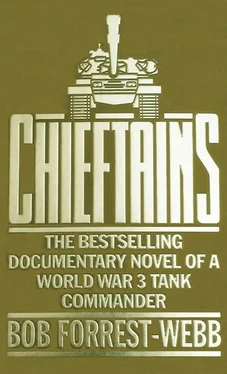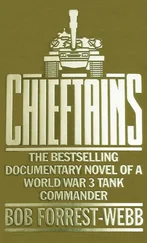‘What’s going to happen to DeeJay?’ Shadwell asked the sergeant.
‘With a bit of luck, he’ll get away with a hefty fine,’ said Morgan Davis. He filled a glass for himself. ‘I’m afraid you’ve had it with your leave, lad.’
‘I fucking knew it,’ swore DeeJay.
‘You shouldn’t have lost your temper,’ Inkester said, unsympathetically. ‘You could have got us all in the shit.’
‘You’re a fine one to talk.’
‘Take it easy… it’s got nothing to do with this afternoon. All leave is stopped; everywhere. The patrols are out, bringing in everyone from the town. Personnel already on leave are being recalled.’
‘What’s going on now, Sarge?’ asked Shadwell’
‘You know almost as much as I do,’ answered Davis. ‘They began evacuating the families an hour ago.’
‘Yeah, some of the blokes are right pissed off. It’ll turn out to be another bloody exercise,’ said DeeJay. ‘Anyhow, I don’t see why it should affect my leave; it’s special.’
‘We’ll all be out of here before 20.00 hours, lad. And if I was you, I wouldn’t press my luck,’ Sergeant Davis warned him. ‘The longer you’re away from camp, the better. Thumping a Cloggie’s bad enough, breaking his jaw was bloody stupid.’ He drained his glass. ‘Anyway, you three have got ten minutes’ start over everyone else. It’ll be coming over the PA shortly. Get yourselves sorted out.’ He stood, screwed the cap back on to the whisky bottle and tucked it under his arm, like a distorted swagger cane.
‘What about Bravo Two?’ asked Deejay. The impact of the Dutch tank had dented the skirt so it dragged on the right track; to Hewett’s ears, always tuned to the performance of his vehicle, it had sounded as though the Chieftain was tearing itself to pieces as he had driven back to the sheds.
‘Good as ever, lads,’ said Davis. ‘The sergeant fitter’s done us a favour.’ He hardened his voice slightly. ‘Drink up then, and make a move. I don’t want a last minute panic just because Shadwell’s forgotten his copy of Wanker’s Weekly.’
In fifty minutes it would be dawn. The night was moonless with the stars obscured by a high layer of thin cloud. Earlier it had drizzled lightly, rain as fine as mist, and now there was the sharp chill of autumn and the metallic scent of damp woodland in the air.
Morgan Davis could feel the cold security of his Chieftain’s armour against his back. Bravo Two rested hull-down below the crest of a ridge of high ground on the Elm Hills, overlooking the plain towards the East German frontier. Tonight the sky was uncharacteristically dark; the black-out of the lights of the town of Helmstedt to the north-east, and those of the numerous small villages, had extinguished the usual warm tinting. A few meters ahead of the sergeant, slightly to his right, small bright glow-worms wavered in the gloom, the fluorescent sights of infantry AR 18 rifles.
There were sounds, unnatural and muffled yet familiar to him; the stifled movement of men in the darkness, whispered conversations, a throat softly cleared, equipment adjusted, the trickle of urine against a tree root; Davis had heard them all before, it seemed like a thousand times.
They had been stationed on the hill for the past five hours, since their night drive down from the 14th/20th King’s Hussars depot; the main battle tanks of Charlie Bravo Troop deployed on the left flank of Charlie Squadron, while those of Alpha and Bravo Squadrons were dug in three-quarters of a kilometer to the south, in the fringes of the woods. The battle group’s reconnaissance Scimitars, light tanks, fast and manoeuvrable, waited a kilometer and a half away towards the east, on the plain itself.
The moist air was condensing on the leaves and polished limbs of the birches, dripping to the thirsty ground beneath. It had been the first rain for almost a month and, although the earth was still firm, its surface was slippery. It would be difficult for tyred vehicles to move through the woodland for the next few hours; the hard sun-baked soil with its fresh thin coating of mud would be like ice beneath the heavy wheels.
Hewett, the Chieftain’s driver, was a lanky Yorkshireman. His nickname DeeJay was an abbreviation of ‘double-jointed’ and stemmed from his ability to fit his tall frame into the cramped driving section of the tank. He was squatting near Sergeant Morgan Davis’s feet, his shoulders wrapped in a waterproof poncho. The gunner, Inkester, was sheltering inside the fighting compartment with Shadwell the loader, who was heating water for mugs of instant coffee.
DeeJay Hewett asked Davis: ‘Why don’t they ever tell us what we’re supposed to be doing?’ Avoiding an immediate interview with his commanding officer hadn’t reduced his despondency. It was Thursday morning now, and he had a useless civil airline ticket in his locker for a flight out of Hamburg airport at 09.00 hours. His wedding, planned for Saturday in the Leeds Registry Office, was a fading dream. There had been hardly enough time for him to telephone England and ask his brother to postpone everything. He knew all the arrangements had been made, the hall for the reception hired and the catering and drink ordered There would be more than fifty guests to contact and furnish with explanations. His fiancée and her family didn’t always understand the ways of the army, perhaps wouldn’t even believe his excuse. DeeJay hadn’t been able to estimate the possible length of the military exercise and so couldn’t promise a future date.
Davis was going to say: ‘We’re already doing what we’re supposed to be doing,’ but instead he remained silent. Hewett’s complaint was only intended to ensure that his senior understood the trooper’s vexation was undiminished. It was a form of blackmail which Sergeant Davis encountered regularly. If there was a vaguely justifiable complaint, some of the men would try to use it as a lever. Hewett would be hoping for some kind of special concession later, relating to his offence, as compensation. Davis knew all the men in Bravo Troop better than his own children; he spent far more time with the men than with his family. The troop had been together for almost two years with no replacements; twelve men in all, including himself and Lieutenant Sidworth. Davis had been married five years, to a German girl he had met in Hamburg. He saw his wife and the twins only at weekends; she refused to live in the regiment’s married quarters near Belsen, so he paid a high rent for a small apartment near her parents’ home in the Hamburg suburbs. It kept her contented, but the Davis family poorer than he thought necessary. He was thirty-two, the oldest man in the troop by seven years, and one of the longest serving NCOs in C Squadron. His Welsh ancestry showed in his short build, dark eyes and black hair, and he still retained the accent of his childhood spent in the market town of Brecon where his father had been a stone-mason. There were few Welshmen in the regiment, which did most of its recruiting in the north-west of England.
The plain below him was still in darkness, but he could easily visualize its hidden landscape. The ground ahead of his Chieftain’s position dropped away quickly through the ordered forest with its plantations of larch, pine and occasional hardwoods, until it reached farmland and the Schöningen Schöppenstedt highway. The fields between the woods and the East German border were hard-worked, interlaced with narrow roads and tracks, their crops of sugar beet almost ready for lifting, the straw for the storage clamps already stacked along the boundaries; Later in the autumn the beet would be delivered to the Schöningen factory for processing.
On the lowest ground was the border itself, the Iron Curtain, one thousand three hundred and ninety-three kilometers of barbed wire, anti-personnel minefields, automatic firing devices, pillboxes and observation towers, where soldiers of the GDR remained unfriendly and aloof.
Читать дальше












